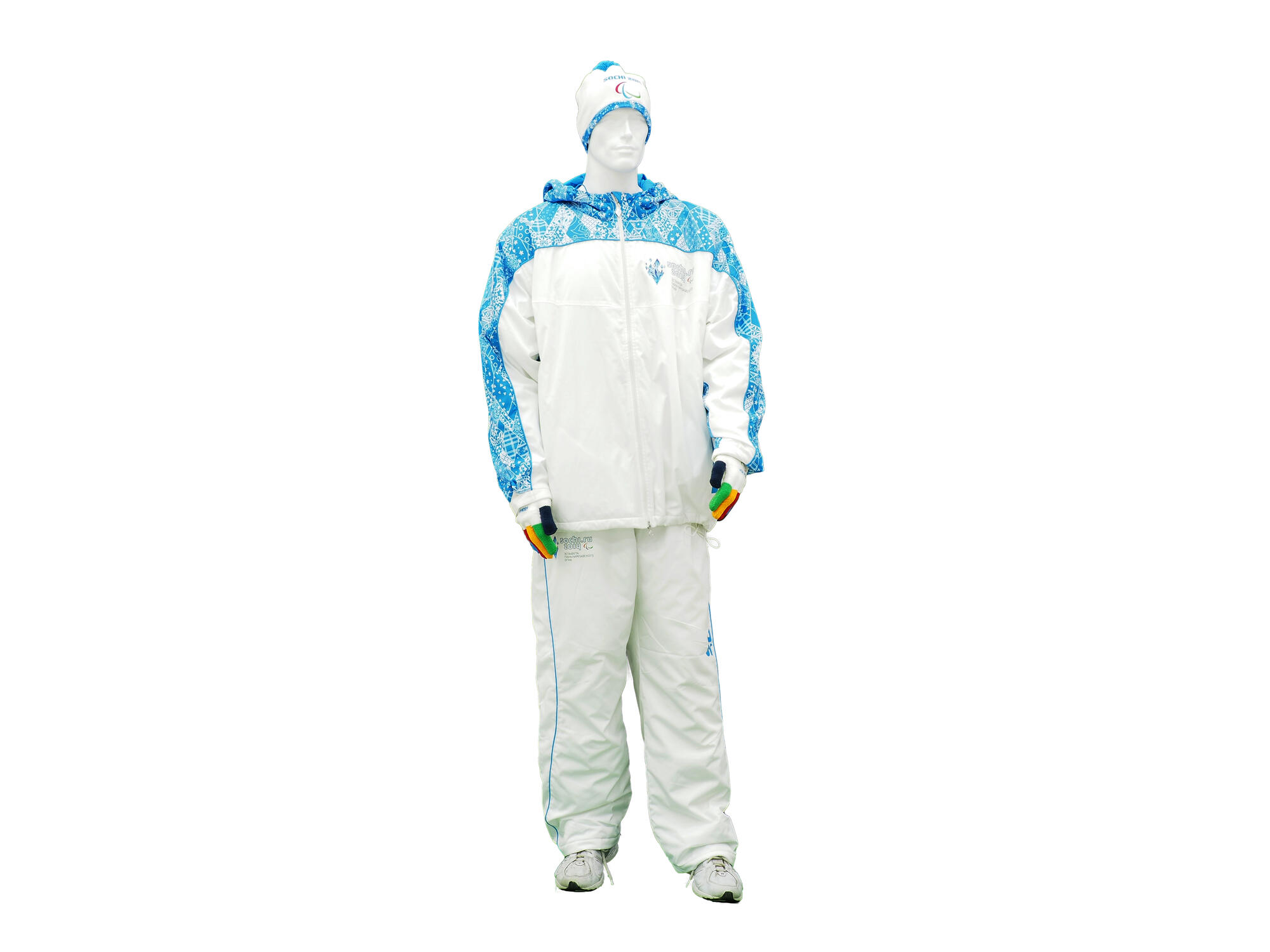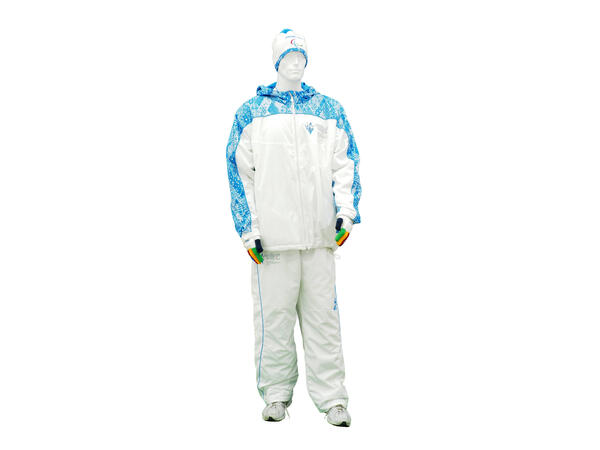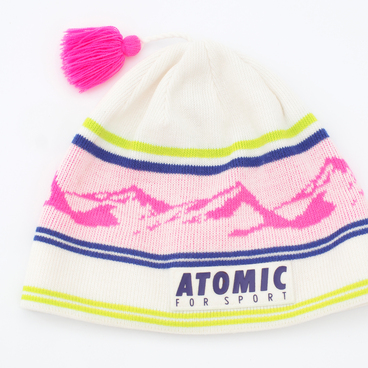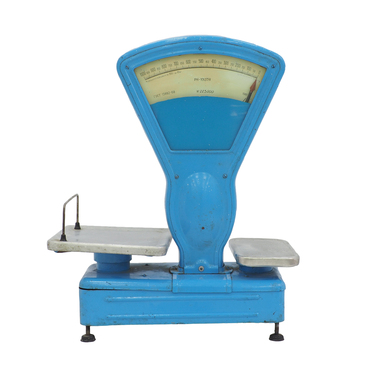In the costume from the museum exhibition, Yuri Telezhkin, along with 19 other torchbearers, took part in the relay of the Paralympics in Seversk on February 27, 2014. The length of the route in the city was 2.7 kilometers.
At 7 p.m. the relay started from the city House of Culture named after Nikolai Ostrovsky and later finished at the Theater Square, where the residents of Seversk met the athletes. The torch of the relay was lit during the opening ceremony of the event.
Unlike the Olympic Torch relay, the torch of the Paralympic Games is not passed from region to region but is lit simultaneously in ten cities of the same federal district of Russia. In 2014, Novosibirsk, Omsk, Ulan-Ude, Biysk, Krasnoyarsk, Sayanogorsk, Gorno-Altaysk, Novokuznetsk and Irkutsk participated in the relay together with Seversk. White and blue colors were chosen for the Paralympics, torchbearers' costumes, torches, and festive balloons.
Yuri Telezhkin devoted his whole life to sports. He was at the origins of sports movement of the classical Greco-Roman wrestling in the Tomsk region. In 1957-1978, Telezhkin became a prize-winner of the championships of Siberia, Kyrgyzstan, and the Central Council of the FIS of Mechanical Engineering. He also received the champion title of the Siberian Military District three times and became the champion of the Tomsk Region 15 times.
While participating in the competitions, Telezhkin coached other athletes. In 1971, he became an instructor at the Seversk sports school ‘Yantar’ and worked in this position for almost 50 years. Yuri Telezhkin trained eight Masters of Sports and 31 candidates for the Master of Sports in Greco-Roman wrestling. He trained such famous athletes and Olympic medalists as the basketball player Sergey Belov, the world and European champion in classical wrestling Alexander Yurkevich, and many other sportsmen.
Yuri Telezhkin also judged the Russian freestyle wrestling championships, the International Greco-Roman Wrestling Tournament ‘Alexander Karelin Prize’ and All-Russian competitions in the Tomsk region.
In Seversk, the coach organized a sports contest among health camps, three All-Russian Greco-Roman wrestling tournaments, and the city Council of sports veterans. He told about his career in the book ‘Sports Republic’.
Yuri Telezhkin died in 2020. For his sports achievements, he was awarded the titles ‘Honored Worker of Physical Culture of the Russian Federation’, ‘Veteran of Labor’, he was awarded the badge ‘Excellent Student of Physical Culture and Sports’ and several medals — including the medal ‘In memory of the 30th anniversary of the games of the 22nd Olympics’.
At 7 p.m. the relay started from the city House of Culture named after Nikolai Ostrovsky and later finished at the Theater Square, where the residents of Seversk met the athletes. The torch of the relay was lit during the opening ceremony of the event.
Unlike the Olympic Torch relay, the torch of the Paralympic Games is not passed from region to region but is lit simultaneously in ten cities of the same federal district of Russia. In 2014, Novosibirsk, Omsk, Ulan-Ude, Biysk, Krasnoyarsk, Sayanogorsk, Gorno-Altaysk, Novokuznetsk and Irkutsk participated in the relay together with Seversk. White and blue colors were chosen for the Paralympics, torchbearers' costumes, torches, and festive balloons.
Yuri Telezhkin devoted his whole life to sports. He was at the origins of sports movement of the classical Greco-Roman wrestling in the Tomsk region. In 1957-1978, Telezhkin became a prize-winner of the championships of Siberia, Kyrgyzstan, and the Central Council of the FIS of Mechanical Engineering. He also received the champion title of the Siberian Military District three times and became the champion of the Tomsk Region 15 times.
While participating in the competitions, Telezhkin coached other athletes. In 1971, he became an instructor at the Seversk sports school ‘Yantar’ and worked in this position for almost 50 years. Yuri Telezhkin trained eight Masters of Sports and 31 candidates for the Master of Sports in Greco-Roman wrestling. He trained such famous athletes and Olympic medalists as the basketball player Sergey Belov, the world and European champion in classical wrestling Alexander Yurkevich, and many other sportsmen.
Yuri Telezhkin also judged the Russian freestyle wrestling championships, the International Greco-Roman Wrestling Tournament ‘Alexander Karelin Prize’ and All-Russian competitions in the Tomsk region.
In Seversk, the coach organized a sports contest among health camps, three All-Russian Greco-Roman wrestling tournaments, and the city Council of sports veterans. He told about his career in the book ‘Sports Republic’.
Yuri Telezhkin died in 2020. For his sports achievements, he was awarded the titles ‘Honored Worker of Physical Culture of the Russian Federation’, ‘Veteran of Labor’, he was awarded the badge ‘Excellent Student of Physical Culture and Sports’ and several medals — including the medal ‘In memory of the 30th anniversary of the games of the 22nd Olympics’.



